NIKE Colin Kaepernick Ad Focusing on Standing Up for What You Believe Draws Both Praise and Criticism – PART ONE : A Well Thought Out Scream by James Riordan
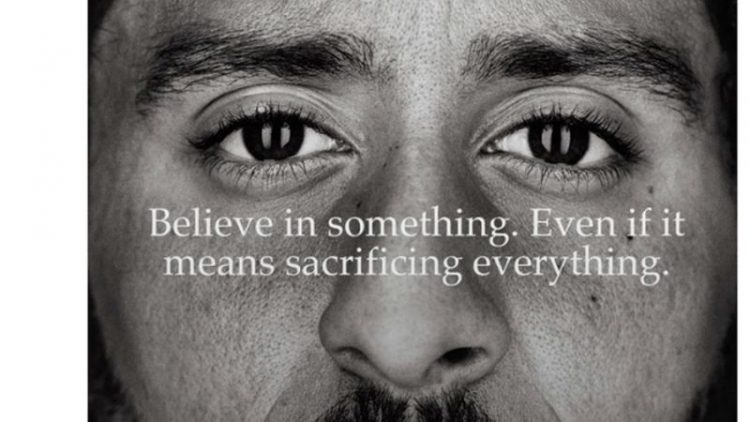
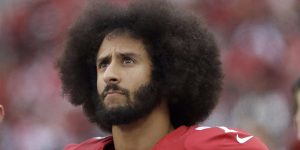 When Colin Kaepernick, quarterback of the San Francisco 49’s sat down during the National Anthem before the team’s first preseason game going into the 2016 season, he probably didn’t realize the impact he would have. What moved him to protest was the deaths of African Americans at the hands of police or while in police custody. This issue became a prominent nationwide concern through the Black Lives Matter movement in the years immediately preceding the protest. Throughout the 2016 season and into the 2017 NFL season the protests grew even spreading to others sports, but by September 24, 2017 over two hundred players sat or knelt during the anthem. Some of this was in response to President Trump issuing a statement that the NFL should fire the protesting players.
When Colin Kaepernick, quarterback of the San Francisco 49’s sat down during the National Anthem before the team’s first preseason game going into the 2016 season, he probably didn’t realize the impact he would have. What moved him to protest was the deaths of African Americans at the hands of police or while in police custody. This issue became a prominent nationwide concern through the Black Lives Matter movement in the years immediately preceding the protest. Throughout the 2016 season and into the 2017 NFL season the protests grew even spreading to others sports, but by September 24, 2017 over two hundred players sat or knelt during the anthem. Some of this was in response to President Trump issuing a statement that the NFL should fire the protesting players.
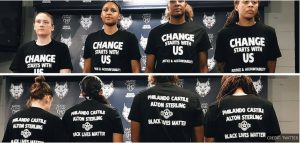 Black WNBA players for the Minnesota Lynx wore Black Lives Matter shirts during warmups following the police killings of Philando Castile in their home state and Alton Sterling in Louisiana in early July. Similarly, after Simone Manuel made history at the Rio Olympics as the first African-American woman to win an individual gold medal in swimming, she called attention to police brutality — just days after the Department of Justice released a scathing report on the Baltimore Police Department, detailing numerous racial abuses endemic to the department that are mirrored in police departments around the country.
Black WNBA players for the Minnesota Lynx wore Black Lives Matter shirts during warmups following the police killings of Philando Castile in their home state and Alton Sterling in Louisiana in early July. Similarly, after Simone Manuel made history at the Rio Olympics as the first African-American woman to win an individual gold medal in swimming, she called attention to police brutality — just days after the Department of Justice released a scathing report on the Baltimore Police Department, detailing numerous racial abuses endemic to the department that are mirrored in police departments around the country.
Police officers have killed at least 2,195 people since Michael Brown was killed in 2014. A disproportionately high percentage of those killed were black. And despite the high frequency with which officer-involved killings take place, hope for accountability is often fleeting because police are rarely indicted for killing civilians, even as more video evidence of those killings becomes available.
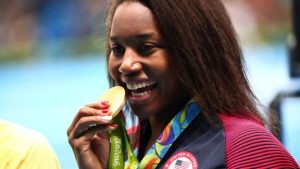 On August 26, 2016, in the early days of the movement Kaepernick said in a post-game, “I am not going to stand up to show pride in a flag for a country that oppresses black people and people of color. To me, this is bigger than football and it would be selfish on my part to look the other way. There are bodies in the street and people getting paid leave and getting away with murder”, adding that he would continue to protest during the anthem until he feels like “[the United States flag] represents what it’s supposed to represent.”
On August 26, 2016, in the early days of the movement Kaepernick said in a post-game, “I am not going to stand up to show pride in a flag for a country that oppresses black people and people of color. To me, this is bigger than football and it would be selfish on my part to look the other way. There are bodies in the street and people getting paid leave and getting away with murder”, adding that he would continue to protest during the anthem until he feels like “[the United States flag] represents what it’s supposed to represent.”
Simone Manuel
After that interview, Kaepernick pledged to donate the first $1 million of his $11.9 million salary from the 2016–2017 season to different organizations that help communities in need. He pledged to donate $100,000 per month for 10 months to various organizations, After a few days, Kaepernick’s team, the San Francisco 49ers, matched hos pledge and donated a million dollars to two organizations that addressed racial and social inequality. Kaepernick followed through on his commitment and has donated to groups such as Meals on Wheels, United We Dream, Black Veterans for Social Justice and many others. Kaepernick has also held “Know Your Rights” camps for young people of color. The camps include legal education from attorneys that give advice on how to interact with police when being detained and lectures from prominent academics on the history of the Civil Rights Movement in the United States. The National Football League Players Association (NFLPA) named Kaepernick the Week One MVP in September 2017 for his charity work related to the protest.
Not surprisingly, there was a substantial backlash to Kaepernick’s protect. According to the Washington Post, Jay Gruden, coach of the Washington, DC’s Redskins, ” said his team has “a ton of respect for what goes on for our country with those people.” On the other hand, some military members expressed solidarity with Kaepernick through the viral hashtag #VeteransForKaepernick shortly after his first protest and the backlash that followed.
In a move to find some common ground, President Obama urgeda genuine conversation instead of arguing. Kaepernick, he said, could acknowledge the pain of someone whose spouse or child “was killed in combat and why it hurts them to see somebody not standing,” or his critics could be mindful of the pain of “somebody who’s lost a loved one that they think was unfairly shot.”
But the sense of disrespect looms, and is compounded by the fact that Kaepernick is richer than most people generally, but also richer than those for whom he is protesting. According to the Pew Research Center, black households earned a median income of $43,300 compared with $71,300 for white households in 2014. Black adults with a bachelor’s degree earned nearly twice as much ($82,300) but still lagged behind their white counterparts of the same educational background ($106,600).
Kaepernick signed a six-year, $114 million contract in 2014. He’s been accused of being too rich to protest racial inequality, which his $11.9 million base salary suggests doesn’t apply to him.
Aside from Kaepernick’s financial privilege, law enforcement officials also felt chided, as Martin Halloran, president of the San Francisco Police Officers Association, noted in an official statement to Jed York, the 49ers president, and NFL commissioner Roger Goodell at the time:
While we certainly acknowledge Mr. Kaepernick’s first amendment right to remain seated during the National Anthem, as inappropriate as that may be, we will not stand by while he attacks police officers in this country with statements such as “People are on paid leave while people of color are killed.”
Not only does he show an incredible lack of knowledge, regarding our profession and “officer involved” shootings, but also shows a naivety and total lack of sensitivity towards police officers. Ironically it is those officers who on numerous occasions have protected Mr. Kaepernick and have ensured that the venues where the NFL holds its events are fully protected.
Halloran was expressing a familiar sentiment from critics of the movement for black lives: that the focus on disproportionate police brutality against black people denigrates police officers. And while on-duty police officer deaths are at a record low, officers are concerned that protests obscure the reality that they put their lives on the line for their job.
But at a moment when America is witnessing the end of the second term of the first black president, there is also an idea that institutional racism no longer exists. As Greg Howard explained for the New York Times, people have gone so far as to redefine racism “to mean malice in one’s heart,” to make it seem like racism is a personal failing of a select group of people and not the product of a broken system.
Muhammad Ali famously refused to fight in the Vietnam War in 1967, not just because it was against his faith but also, more bluntly, because the Vietnamese, as he said, never “called me [racial slur].”
As Ali recounted in an interview with Esquire: I came back to Louisville after the Olympics with my shiny gold medal. Went into a luncheonette where black folks couldn’t eat. Thought I’d put them on the spot. I sat down and asked for a meal. The Olympic champion wearing his gold medal. They said, “We don’t serve niggers here.” I said, “That’s okay, I don’t eat ’em.” But they put me out in the street. So I went down to the river, the Ohio River, and threw my gold medal in it.”
The story is as much a testament to Ali’s classic comedic bravado as it is a sobering reminder that no accolade, not even an Olympic gold medal in light heavyweight boxing at the 1960 games in Rome, could shield him from being treated like a second-class citizen.
State senators in Ali’s home of Kentucky went so far as to pass a resolution stating, “[Ali’s] attitude brings discredit to all loyal Kentuckians and to the names of the thousands who gave their lives for this country during his lifetime.”
Nike’s new campaign celebrating the 30th anniversary of “Just Do It,” which features former NFL player Colin Kaepernick, has been at the center of controversy this week.
On Monday, Kaepernick shared an image of his face on Twitter with the words “Believe in something. Even if it means sacrificing everything.” Nike retweeted the image, which reportedly kicks off a new multiyear deal between the former NFL player and the sportswear company.
Nike announced Kaepernick’s participation Monday, and the ad premiered Tuesday. Between Wednesday and Friday evening it had been viewed nearly 14 million times on YouTube. Film director Spike Lee on Friday called Nike’s decision to feature Kaepernick “very courageous” in the face of relentless criticism by Trump over the NFL protests during the national anthem. “I think Nike’s on the right side of historywith this move,” he told ESPN. On Wednesday, Nike released the full version of the commercial, which is narrated by Kaepernick and features a range of athletes including inspirational amateurs, Serena Williams, and LeBron James.
“I don’t like what Nike did. I don’t think it’s appropriate what they did,” President Donald Trump said in a Thursday interview with Fox News before a rally in Montana. “I honor the flag. I honor our national anthem and most of the people in this country feel the same way.”
On Friday morning, Trump tweeted, “What was Nike thinking?”
There were no clear-cut protests as “The Star-Spangled Banner” played before the game with both teams on the field and the song broadcasted nationally.
Some have accused Kaepernick and players who followed in his footsteps as disrespecting the American flag and the military, and quickly 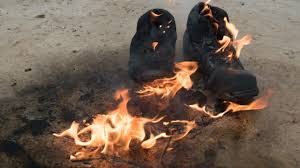 began threatening to boycott the brand in response to the ad, with some even going so far as burning their Nike shoes.
began threatening to boycott the brand in response to the ad, with some even going so far as burning their Nike shoes.
Nike’s online sales have rocketed since the company announced that Kaepernick would be the face of the thirty year anniversary of their “Just Do It” ad campaign.President Donald Trump, who railed against Nike’s homage to the gridiron protester, insisted Wednesday that Nike was “getting absolutely killed with anger and boycotts” because of the ad.
Online sales jumped 27 percent from Sunday through Wednesday, according to Edison Trends, a Silicon Valley digital sales and trends research firm. Nike’s sales decreased 2 percent during the same period last year, according to Edison figures.
“There was speculation that the Nike/Kaepernick campaign would lead to a drop in sales but the Edison Trends data does not support that theory,” Edison co-founder Hetal Pandya said in a statement to HuffPost.
Nike’s emotional ad pays homage to those who “dream crazy.” It features several athletes, including tennis ace Serena Williams and hoop star LeBron James, and many athletes who overcome serious challenges.
It’s narrated by Kaepernick, who launched the movement to take a knee during the national anthem before NFL games to protest racial inequality and police brutality. “Believe in something,” the ad concludes. “Even if it means sacrificing everything.”
Tiger Woods on Friday called the ad a “beautiful spot.” He told ESPN: “I think Nike is trying to get out ahead of it and trying to do something special, and I think they’ve done that.”
Social media chatter about Nike has also skyrocketed since the campaign began. “Kaepernick” and “Nike” both trended on Twitter after the campaign was announced. Comments about Kaepernick jumped an astonishing 360,000 percent, according to trend-tracking company 4C Insights
Not that there hasn’t been a backlash. Some customers cut up its products or burn them because of the company’s decision to make Colin Kaepernick the face of its “Just Do It” 30th anniversary campaign. With the Kaepernick campaign , Nike is embracing activism and racial justice at a time when shoe companies can no longer avoid the nation’s political division. After years of building billion-dollar brands around sports celebrities, shoe and apparel makers now find themselves flashpoints in the political, racial and cultural clashes surrounding the Trump administration. Nike took this route as its biggest representatives — most notably LeBron James and Serena Williams — have spoken out about police shootings of African-American men and problems facing the black community.
Those same athletes are increasingly using their shoes as a form of expression. James’ “Equality” Nike signature shoe was unveiled earlier this year , with the word emblazoned across the back of the shoes. Steph Curry has worn a Barack Obama-themed shoe. NBA players in recent years have worn shoes with messages of “R.I.P. Trayvon Martin” and “Sideline Racism” and images of Ebenezer Baptist Church, where the Rev. Martin Luther King Jr. preached. Such statements could become more common in the next season after the NBA relaxed the rules over the types of shoes players can wear. “I stand with Nike, every day, all day,” James said Tuesday at a Nike fashion show and awards ceremony in New York.
Trump has blasted the NFL for allowing players to follow Kaepernick’s decision to kneel during the national anthem to protest police shootings of African-Americans. Now the president has turned against Nike, which is making the former San Francisco 49ers quarterback one of its main spokesmen. “Nike is getting absolutely killed with anger and boycotts,” Trump tweeted Wednesday .
Athletic apparel companies have straddled the entertainment and cultural worlds for years partly with their emulation of black culture — think Run-DMC’s Adidas shoe deal in the wake of the group’s rap hit “My Adidas” and Nike’s “Air Jordan” campaigns featuring Michael Jordan and Spike Lee. This has created a billion-dollar industry and the cultural challenge of how to appeal to minority and youth communities as well as to the country’s white, sometimes conservative, majority.
But the companies and major sports leagues have been careful not to stray into real politics, famously symbolized by Jordan, who reportedly said Republicans buy shoes, too. While Jordan and others in his era were thrilled to have lucrative shoe deals, the current generation is going farther by using their sneaker deals as a platform to promote social justice.
And with that shift, Nike is taking the side of its superstar athletes — even if it means alienating Trump supporters and intertwining shoes and politics. Many companies “feel the need to align with players, because players help them move the product,” said Michael Lewis, director of the Marketing Analytics Center at Emory University in Atlanta.
PART TWO NEXT WEEK


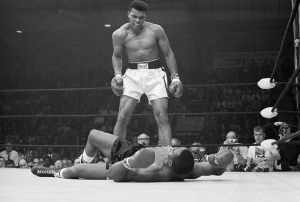

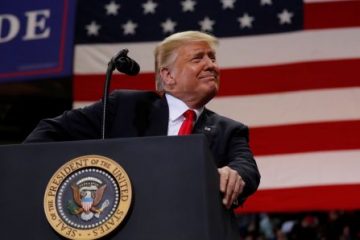
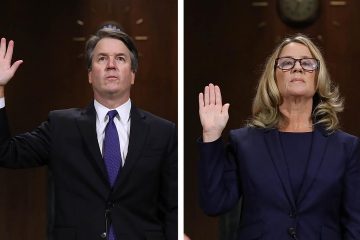
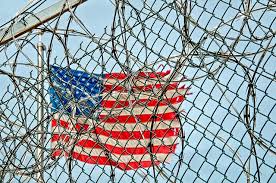

No Comment